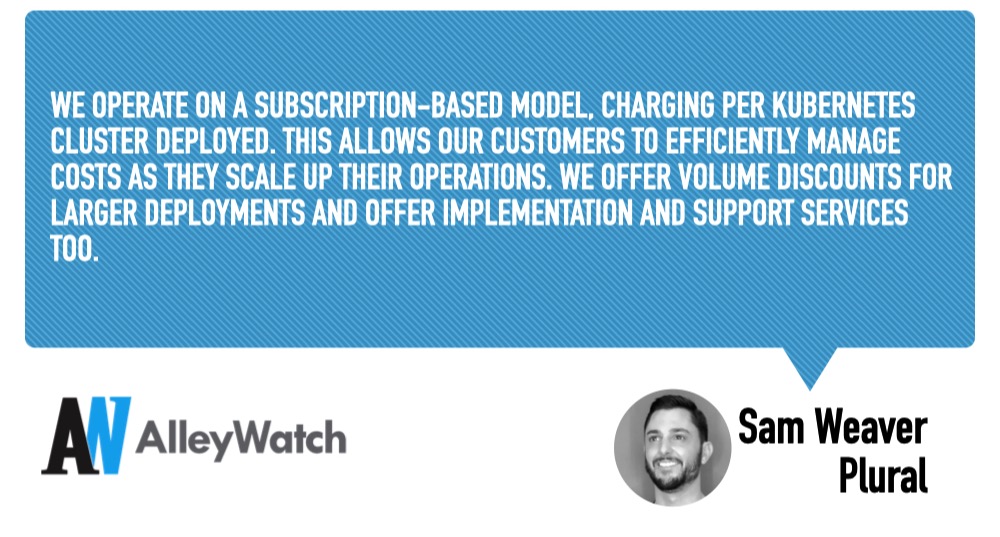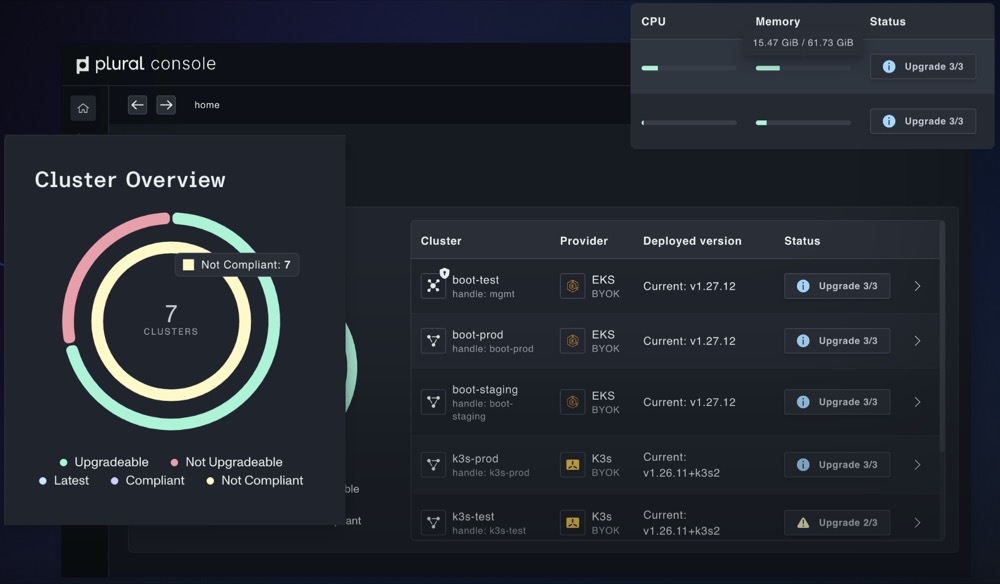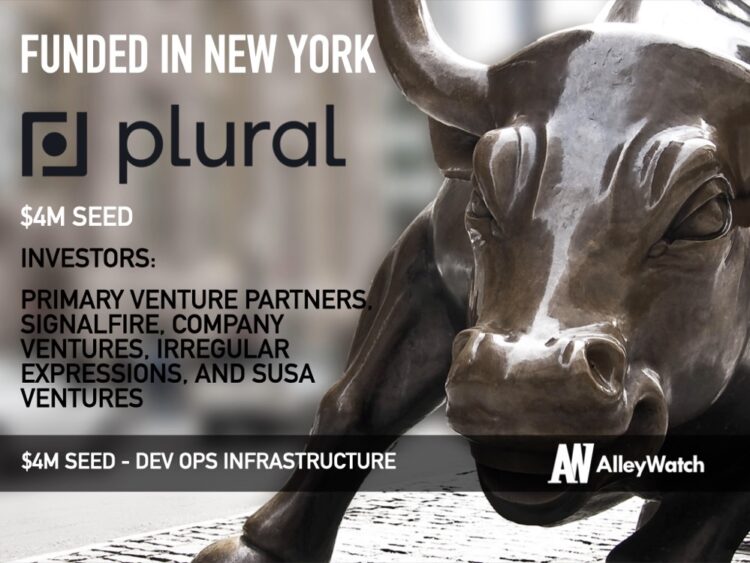Kubernetes has emerged as the go-to solution for containerized application deployment and scaling. However, as organizations expand their Kubernetes adoption, they often face challenges in managing multiple clusters efficiently. Plural addresses this pain point by offering a robust Kubernetes fleet management platform tailored for enterprise needs. Plural empowers businesses to centralize control over their Kubernetes environments, enabling consistent policy application, streamlined configuration management, and coordinated updates across multiple clusters. The platform breaks down barriers to Kubernetes adoption, making it accessible to engineers of all skill levels and eliminating the need for specialized resources dedicated solely to infrastructure management. With its lightweight, self-hosted architecture, Plural seamlessly integrates into any Kubernetes distribution or cloud environment. This flexibility allows organizations to leverage their existing infrastructure investments while gaining the benefits of centralized fleet management. Organizations implementing Plural have reported an 88% reduction in operational costs and a remarkable 95% decrease in day-2 operations while engineering teams have experienced a 50% increase in available bandwidth, allowing them to focus on core business initiatives rather than infrastructure maintenance.
AlleyWatch caught up with Plural CEO Sam Weaver to learn more about the inspiration for the business, the company’s strategic plans, recent round of funding, and much, much more…
Who were your investors and how much did you raise?
We raised a $4M Seed prime round. Investors include Primary Venture Partners, SignalFire, Company Ventures, Irregular Expressions, and Susa Ventures.
Tell us about the product or service that Plural offers.
Plural is a self-hosted Kubernetes fleet management platform that provides a single pane of glass for managing multiple clusters and automating upgrades, complete with enterprise-grade security features. Our solution helps DevOps and platform engineering teams automate and streamline the lifecycle management of Kubernetes fleets, making Kubernetes accessible to engineers of all skill levels by reducing painful day 2 operational challenges.
What inspired the start of Plural?
 The inspiration for Plural came from our own struggles with managing Kubernetes at scale. Back in 2021, my cofounder Michael Guarino and I were building infrastructure to simplify the deployment of open source applications on Kubernetes. As we dove deeper into this work, we found ourselves spending an inordinate amount of time on cluster maintenance and using tons of fragmented tooling. It became clear that while Kubernetes was powerful, managing it at scale was a significant challenge that existing tools weren’t adequately addressing.
The inspiration for Plural came from our own struggles with managing Kubernetes at scale. Back in 2021, my cofounder Michael Guarino and I were building infrastructure to simplify the deployment of open source applications on Kubernetes. As we dove deeper into this work, we found ourselves spending an inordinate amount of time on cluster maintenance and using tons of fragmented tooling. It became clear that while Kubernetes was powerful, managing it at scale was a significant challenge that existing tools weren’t adequately addressing.
This realization was a lightbulb moment. We saw an opportunity to create something that could dramatically reduce the operational overhead of Kubernetes and make it accessible to engineers of all skill levels. Drawing from our previous experience we evolved Plural from its initial concept into a comprehensive fleet management platform. Our goal became not just to create another Kubernetes tool, but to fundamentally transform how organizations approach Kubernetes at scale. We wanted to free up engineering resources from the complexities of infrastructure management, allowing teams to focus on innovation and building great products. That’s the vision that continues to drive us at Plural today.
How is Plural different?
Plural stands out by offering a powerful self-hosted solution that allows organizations to maintain control over their data while benefiting from advanced management capabilities. Our platform is designed to be lightweight, extensible, and developer-friendly, working with enterprises from day one to ensure workflows can be modeled without forcing conformity to inflexible patterns. The product offers features like automated dependency management, version compatibility matrices, and support for air-gapped deployments, which are crucial for highly regulated industries.
What market does Plural target and how big is it?
Plural targets enterprises with large Kubernetes footprints, particularly in industries like financial services, healthcare, and technology. Our ideal customers are organizations managing 30+ Kubernetes clusters across multiple environments. The market for Kubernetes management solutions is a multi-billion dollar opportunity and rapidly growing as more companies adopt containerization and microservices architectures, which is also being driven by AI and edge computing.
What’s your business model?
We operate on a subscription-based model, charging per Kubernetes cluster deployed. This allows our customers to efficiently manage costs as they scale up their operations. We offer volume discounts for larger deployments and offer implementation and support services too.

How are you preparing for a potential economic slowdown?
The raise puts us in a really strong position to go and execute on our business goals. We’ve grown the team diligently, and maintaining a lean, but high velocity team moving forward. We’re focused on delivering measurable value and ROI to our customers, which becomes even more critical during economic uncertainties. By helping organizations significantly reduce operational costs and improve efficiency in their Kubernetes management, we position ourselves as a solution that can help companies optimize their infra spend.
What was the funding process like?
Super positive, with strong interest from investors who recognize Kubernetes is the gold standard in the enterprise, but the existing ecosystem is super complex and fragmented. We were able to secure commitments from incredible firms that have a track record of supporting successful enterprise software companies.
What are the biggest challenges that you faced while raising capital?
As a seed-stage company in a complex technical space, one of our main challenges was effectively communicating the complexity our platform solves to investors who might not be deeply familiar with Kubernetes and its challenges. Luckily we met with some incredible partners at firms with infra experience. Once we walked through the product, we focused on highlighting real-world use cases and the significant ROI our early customers were experiencing.

What factors about your business led your investors to write the check?
Our investors were impressed by several factors:
- Early customer traction and positive feedback from notable enterprises
- The platform’s ability to address critical pain points in Kubernetes fleet management
- The rapidly growing market demand for Kubernetes management solutions
- Our team’s deep expertise in cloud infrastructure and enterprise software
What are the milestones you plan to achieve in the next six months?
In the next six months, we plan to expand our customer base, particularly in the financial services and healthcare sectors. We’ll continue to iterate on the product based on customer feedback and emerging Kubernetes trends. We’re working to achieve key security certifications to support customers in highly regulated industries and we’re building out additional firepower in the team, particularly in engineering and go-to-market roles.
What advice can you offer companies in New York that do not have a fresh injection of capital in the bank?
(1) Focus on creating tangible value for your customers and demonstrating clear ROI. In these challenging economic times, platforms and solutions that can help businesses optimize costs and improve efficiency become even more attractive. (2) Build strong relationships with your early customers and leverage their success stories in your sales process. (3) Remove anything thats not critical – be prepared to operate lean and prioritize the initiatives that will drive the most significant impact for your business and customers.
What’s your favorite fall destination in and around the city?
Central Park is always beautiful in the fall, with the changing colors of the leaves creating a stunning backdrop in the heart of the city. It’s a great place to take a break from the fast pace of startup life and enjoy the season.





